At our company, we understand the importance of sustainable waste management in agriculture. Implementing sustainable practices not only benefits the environment but also improves soil health and crop productivity.
Sustainable waste management in agriculture involves implementing practices that minimize waste generation, promote recycling, and reduce environmental impact. By adopting sustainable waste management practices, farmers can contribute to a healthier ecosystem and sustainable food production.
Facing the challenges of managing farm waste effectively is a critical issue for farmers and environmentalists alike. Copious amounts of organic matter, from livestock manure to crop residues, are generated regularly on farms across the globe.
Dealing with this waste in environmentally friendly and economically viable ways is paramount to sustainable farming practices.
Anaerobic digestion stands out as one such solution, transforming what would otherwise be waste into valuable resources. This innovative process not only helps tackle the problem of pollution but also paves the path towards renewable energy production on farms.
Our article dives into this green technology, revealing how it can revolutionise farm waste management by turning potential pollutants into power and fertiliser. By embracing anaerobic digestion techniques, farmers can significantly lower their carbon footprint while enhancing soil health and complying with environmental protection standards.
Ready to uncover how? Keep reading to explore the transformative impacts of anaerobic digestion on farming sustainability.
Sustainable Waste Management in Agriculture – Key Takeaways
- Anaerobic digestion turns farm waste like manure and spoiled produce into biogas and fertiliser, helping farms be more green.
- Managing farm waste well keeps the land healthy, reduces pollution, and saves energy costs for farmers.
- Different types of waste on farms include crop leftovers, animal poo, inedible food, and old plastics; each needs a smart way to be dealt with.
- Poor handling of farm waste can harm people's health and mess up our waterways. It's important to do it right.
- Using anaerobic digestion helps fight climate change by cutting down on greenhouse gases released from rotting waste.
[boomdevs_toc]
What is Farm Waste Management?
Farm waste management refers to the processes and strategies used to handle, recycle, and dispose of agricultural waste in a sustainable and environmentally friendly manner. It is crucial for reducing the impact of farming activities on the environment and ensuring efficient use of resources.
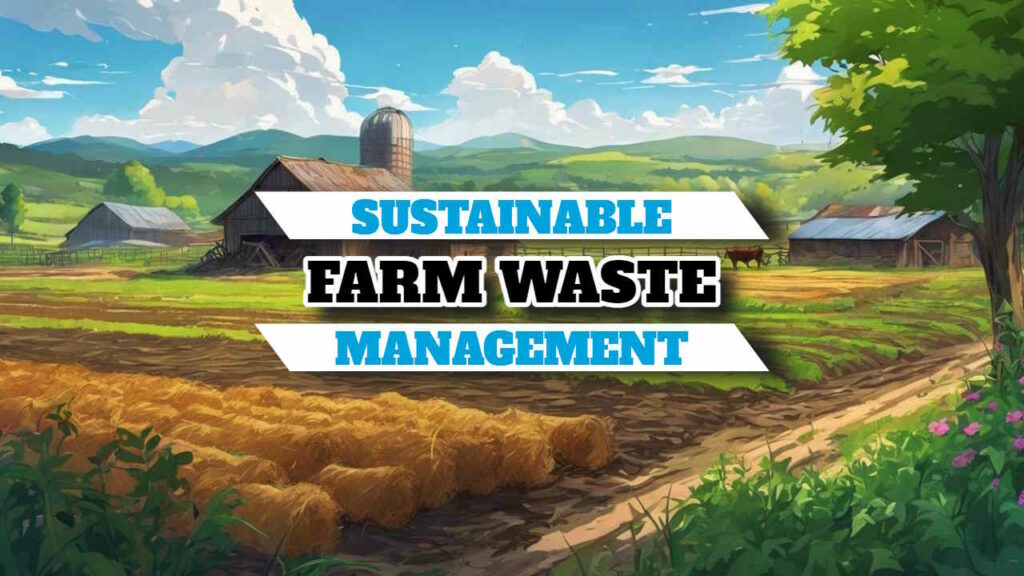
Farm Waste Management – A Definition
Farm waste management means handling leftover materials from growing crops and raising animals. It's all about dealing with things like dead plants, manure, spoiled food, and old plastic safely and smartly.
This helps farms stay clean and stops harm to nature.
Being good at managing farm waste is a big deal. It keeps the land healthy for future crops and animals. Plus, it makes sure farmers follow the rules set by groups like the Environment Agency.
Badly managed farm waste can harm people's health and mess up the water we drink.
With anaerobic digestion, bacteria turn organic stuff into fertiliser without using air. This process takes care of farm leftovers in a useful way. By turning them into something that helps new plants grow, it recycles what would be trash otherwise.
It’s a key part of keeping farms working well while protecting our earth.
Importance
Managing farm waste well is key to keeping our environment safe. It stops harmful chemicals and plastics from entering the soil and water, which can hurt plants, animals, and even people's health.
Good waste management also means farmers can reuse things like manure to make their land more fertile instead of using chemical fertilisers that can be bad for the earth.
Anaerobic digestion plays a big role here by turning organic waste into energy without needing oxygen. This process cuts down on greenhouse gases that would otherwise come from rotting waste.
It's an eco-friendly way to deal with leftovers from farms that helps fight climate change.
After understanding its importance, it's clear why we need smart ways to manage all kinds of agricultural wastes. Now let’s explore the different types of farm wastes out there.
Challenges
Farm waste management is tough for small and medium farms that don't have much money or many things they need. It's hard to deal with all the waste in a way that doesn't hurt the land or cost too much.
Farms make lots of different kinds of waste, like animal poo and old crops. They must find ways to get rid of this rubbish without causing harm.
One big issue is what to do with digestate from anaerobic digestion, which can be really good for plants but also add too many nutrients if it’s not used right. This can lead to water pollution, which harms fish and other water life.
Another problem is making sure that soils stay healthy by turning plant and animal leftovers back into useful stuff for growing crops again.
Next up, let's look at the types of farm wastes we’re dealing with.
Types of Farm Wastes
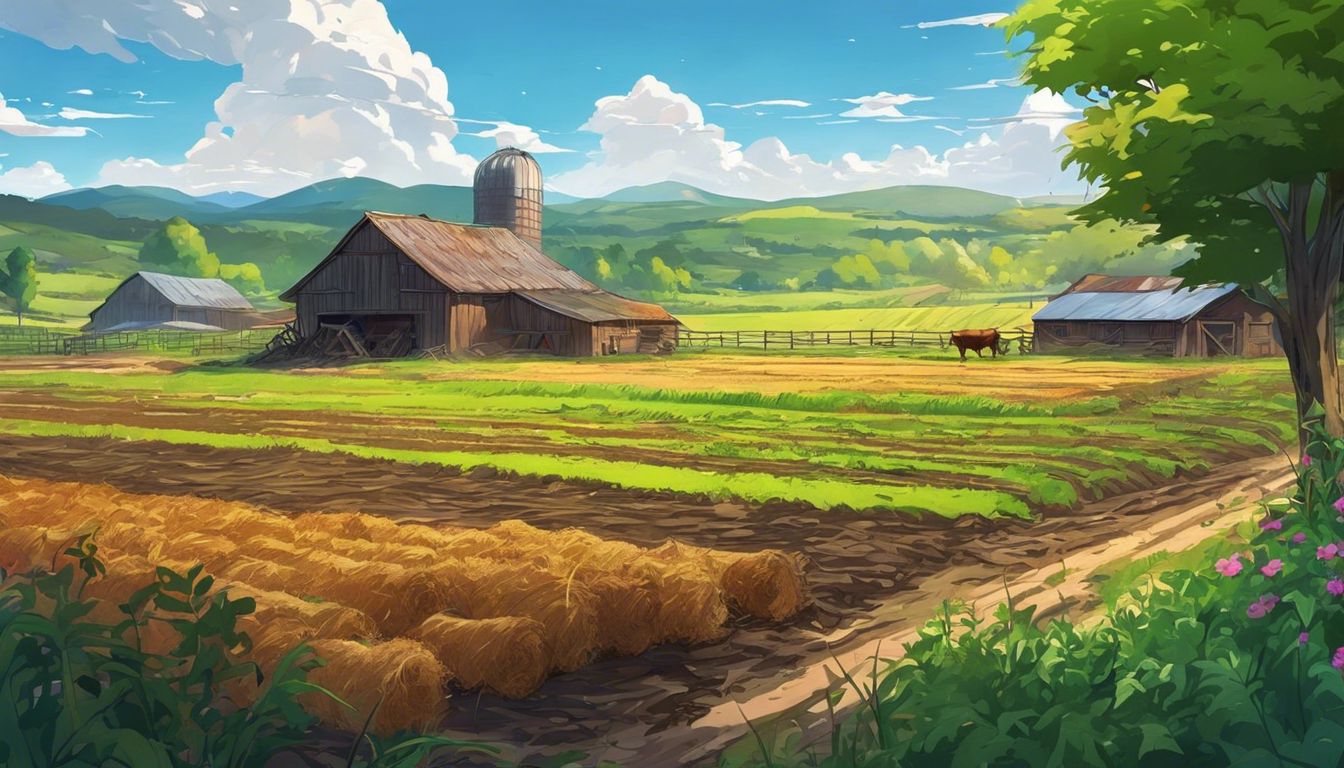
Farm waste includes crop residues, livestock manure, spoilt or discarded produce, and agricultural plastics and pesticide containers. Each type of waste presents its own challenges for effective management and disposal.
Crop residues and weeds
Farmers often have leftover bits from their crops and unwanted plants like weeds after they are done harvesting. These leftovers can pile up and become a big problem if not handled right. For example, crop residues if piled up near a watercourse or a water supply borehole can produce a high BOD, high COD run-off that can easily pollute the local environment.
But, there's good news! We can turn these wastes into something useful instead of letting them go to waste.
Composting is a great way to manage crop leftovers and weeds. When farmers mix these with other organic waste from the farm, it breaks down over time. This process makes a rich food for the soil called compost which helps new plants grow better.
Another smart way to use crop residues is in anaerobic digestion (AD) plants. Here, the residues get broken down without air, making biogas that we can use as energy. Research shows this method works well and even though you need special permission to do it, it's worth it because of the energy you can make. The sale of methane, or electricity generated can be very profitable at the current high cost of energy.
Livestock manure
Moving from plant-based waste, livestock manure emerges as another significant type of farm waste. It is rich in nutrients and can act as a natural fertiliser for crops, making it very valuable on the farm.
Proper handling ensures that these benefits reach the soil without causing harm.
Livestock manure offers a chance to recycle essential elements like nitrogen and phosphorus back into crop production. Using this resource wisely helps maintain soil fertility. However, it must be managed well to avoid environmental contamination.
Anaerobic digestion stands out as a smart way to deal with animal waste. This process turns manure into biogas and an improved organic fertiliser while also cutting down on odours and pathogens that might otherwise pose risks to human health.

Spoilt or discarded produce
Food that never makes it to our plates can harm the environment. Spoilt or discarded produce includes fruits and vegetables that go bad before someone buys them. They get thrown out, adding to the big pile of food waste.
Throwing away spoilt food also means wasting all the water, energy, and labour used to grow it.
Turning this unwanted produce into something useful is where anaerobic digestion comes in. This process takes spoilt produce and turns it into biogas—a type of green energy—and liquid fertiliser for plants.
Using every bit of wasted food helps farms be more sustainable and cuts down on the harm done to our world if this resource is not used.
The next part talks about another kind of farm waste: agricultural plastics and pesticide containers.
Agricultural plastics and pesticide containers
After talking about spoilt produce, we see another big issue: plastic films and pesticide containers on farms. These items can accumulate on the land if not handled properly. They can harm livestock that try to eat them and cause serious entanglement issues. Farmers use a lot of plastic for things like covering crops (silage) and wrapping bales and therefore constant vigilance is needed to keep plastic wastes under control.
Another concern on many farms is the responsible disposal of empty pesticide and fungicide bottles after their use protecting crops from bugs and diseases.
Worst of all, plastic waste does not decompose. It lasts a very long time without breaking down, which is bad for our planet. It will all eventually make its way into waterways or harm animals. That's why it's so important to deal with it carefully.
Special purpose-designed recycling facilities can take in these plastics and containers, clean them up, and turn them into new products – this is called recycling.
Some farmers might not know the best way to dispose of pesticide bottles safely. They may not be aware that these are classed as hazardous waste. Not understanding the regulations that apply to hazardous waste disposal from farms can lead to dangerous chemicals getting out into nature where they shouldn't be.
We need to teach everyone which wastes are hazardous and how to manage hazardous wastes properly so that our environment stays safe and healthy.
It’s all part of making sure farming doesn’t do more harm than good to our earth.
Now let us move on to talk about:
The Role of Anaerobic Digestion
Anaerobic digestion is a process that converts organic waste into biogas and nutrient-rich digestate. This method not only helps in waste reduction but also contributes to renewable energy production and sustainable agricultural practices.

Process
Anaerobic digestion, a natural process, uses bacteria to break down organic material like animal manure and food waste. This process occurs in the absence of oxygen and produces biogas, which consists of methane, carbon dioxide, and trace elements.
- Biodegradable Material Breakdown: The anaerobic digestion process breaks down biodegradable materials using natural bacteria without oxygen.
- Biogas Production: It converts the organic matter into biogas, containing methane and carbon dioxide as its primary components.
- Environmental Benefits: Anaerobic digestion helps in waste management while producing a sustainable energy source that can be used for power generation or heating.
- Reduction of Greenhouse Gases: By breaking down organic matter in an oxygen-free environment, anaerobic digestion reduces greenhouse gas emissions compared to other forms of waste disposal.
- Nutrient Recycling: Anaerobic digestion also facilitates nutrient recycling from organic materials back into the soil when the digestate is used as fertiliser.
Benefits
- Harnesses natural bacteria to treat biodegradable materials in the absence of oxygen, producing biogas.
- Produces renewable energy from livestock manure, preventing the release of methane and reducing air and water pollution.
- Plays a significant role in converting organic compounds in waste into biogas, comprising 60%–70% methane.
- Contributes to sustainable farm waste management and wastewater treatment.
- Reduces greenhouse gas emissions while providing an additional source of renewable energy.
- Helps farmers save on energy costs by utilising biogas as a renewable energy source.
- Provides a sustainable solution for managing agricultural waste that also reduces environmental harm and benefits local communities.
- Provides local employment
Strategies for Effective Farm Waste Management
Effective farm waste management involves closely monitoring waste production, implementing hazardous waste management techniques, and utilising reduction strategies to minimise the overall impact on the environment.
These strategies play a crucial role in promoting sustainable practices within the agricultural sector.
Monitoring waste production
To effectively manage farm waste, monitoring waste production is crucial. This involves tracking the amount and types of waste generated on the farm regularly. By understanding the volume and composition of agricultural waste, farmers can identify areas for reduction and recycling.
Monitoring also helps in assessing the effectiveness of waste management strategies over time.
Furthermore, regular monitoring enables the identification of potential environmental impacts associated with specific types of agricultural waste. It allows for proactive measures to be implemented to mitigate these impacts, ensuring sustainable agricultural practices.
Hazardous waste management
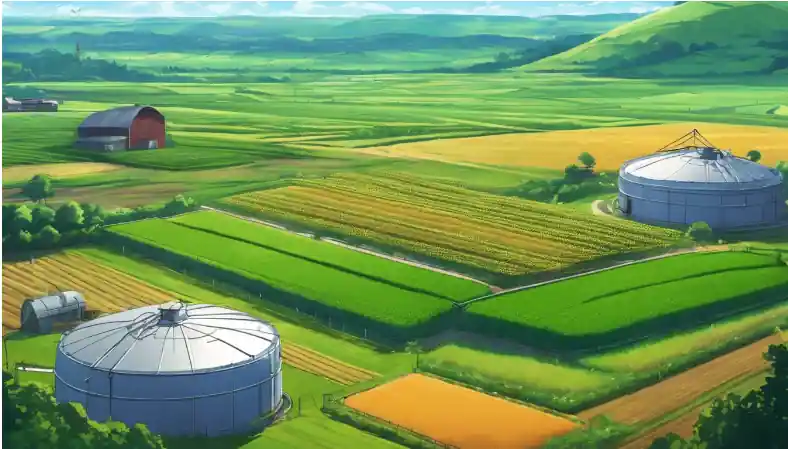
Hazardous waste on farms can be very dangerous for the environment and the people working there. It's important to handle these wastes properly to keep everyone safe. Hazardous farm waste, like pesticide containers, can harm the soil and water if not disposed of correctly.
Also, it can affect animals' health.
Ensuring compliance with regulations is crucial for managing hazardous farm waste. Regular monitoring of waste production and efficient strategies for reducing hazardous waste are essential in sustainable agricultural management practices.
Promoting safety and environmental responsibility in handling hazardous wastes creates a safer working environment while minimising negative impacts on the ecosystem.
Farm Waste Reduction Techniques
- Implementing precision farming techniques to optimise the use of synthetic fertilisers and reduce over-application.
- Introducing on-farm composting to convert kitchen waste and farm scraps into nutrient-rich compost for agricultural use.
- Utilising efficient packaging designs to minimise agricultural plastics and pesticide containers, thus reducing plastic waste.
- Encouraging the recycling of agricultural plastics through proper collection and recycling infrastructure, thereby diverting them from landfills.
- Promoting food loss prevention strategies such as collaborating with food banks or utilising spoiled produce for animal feed to minimise overall wastage.
- Introducing cover crops to reduce soil erosion, retain nutrients, and increase organic matter in the soil, thus reducing waste in agricultural activities.
- Emphasising sustainable land management practices such as crop rotation and conservation tillage to improve soil health and reduce overall waste production.
- Educating farmers on effective water management techniques that conserve water resources and minimise nutrient loading in agricultural runoff.
- Incorporating energy sources derived from biogas generated through anaerobic digestion of organic farm waste, contributing to a circular economy approach.
- Promoting the adoption of green living practices within the agriculture industry by encouraging farms to reduce, reuse, and recycle resources wherever possible.
Impact on the Environment and Sustainable Solutions
Agricultural waste can have harmful effects on the environment, including contamination of soil and water sources. Implementing sustainable management practices, such as recycling, composting, and anaerobic digestion, can help reduce these impacts and contribute to a more environmentally friendly farming industry.
Harmful effects of agricultural waste occur due to improper management of agricultural waste can harm the environment, leading to water pollution and reduced soil fertility. It also impacts human health by causing amenity and economic loss and posing a threat through environmental pollution.
An example is nutrient pollution which has recently downgraded the use of the River Wye on the English-Welsh border. As of 2023, the previously thriving canoe hire industry has been destroyed by a lack of demand. There is no recreational amenity value in an ecologically-dead river.
Nutrient pollution from agricultural waste, like that now affecting the River Wye, can lead to harmful algal blooms, hypoxia, and eutrophication. These impacts pose risks to the environment and human safety.
How to implement sustainable farm waste management
- Utilise anaerobic digestion technology to convert organic waste into biogas, reducing greenhouse gas emissions and producing renewable energy, as supported by AD's lower environmental impacts compared to incineration and landfilling.
- Promote the use of composting techniques for crop residues and weeds, livestock manure, and spoiled produce, reducing waste volume and enhancing soil fertility while combatting climate change.
- Encourage the recycling of agricultural plastics and pesticide containers to minimise packaging waste, conserving water, and preventing soil contamination, aligning with a commitment to social and environmental responsibilities.
- Implement effective monitoring systems for waste production on farms to identify opportunities for reduction techniques, such as food loss prevention strategies that align with duty of care principles.
- Advocate for the responsible management of hazardous waste through proper collection and disposal methods, ensuring compliance with regulations to protect human health and the environment while reducing pollution from decomposition.
UK Guidance for Effective Farm Waste Management: Reduce, Reuse, Recycle
Introduction to the UK Section of this Article
Sustainable farm waste management is crucial for both economic and environmental benefits.
The principles of reduce, reuse, and recycle offer practical strategies to achieve this goal. By adopting these practices, farmers can not only save money but also contribute positively to the environment.
Key Strategies and Benefits
1. Reduce and Reuse Materials:
- Economic Benefit: Reducing and reusing materials on the farm saves money by minimizing the need for new materials and reducing waste disposal costs.
- Environmental Impact: This practice keeps valuable resources in the environment and reduces potential impacts to soil, air, and water.
2. Effective Use of Organic Wastes:
- Economic Benefit: Utilizing farm organic wastes as fertilizers can significantly reduce the costs associated with manufactured fertilizers.
- Environmental Impact: Spreading animal wastes improves nutrient and water retention in the soil, enhancing its quality.
3. Sustainable Material Usage:
- Economic Benefit: Meeting customer and accreditation scheme requirements can open up new market opportunities.
- Environmental Impact: Sustainable materials and reduced consumption of non-renewable resources lower carbon emissions and enhance community reputation.
Now let's look at these strategies and apply them to the top 4 areas of successful farm waste management:
Practical Actions and Resources
1. Material Management:
- Actions: Explore ways to reduce material use, buy only what is needed, and request sustainable packaging.
- Resources: Guidance from Gov.uk on waste hierarchy and saving money by reducing waste.
2. Integrated Farm Management:
- Actions: Adopt approaches like Integrated Farm Management, use soil-enriching cover crops, and consider natural mulches.
- Resources: Information from LEAF (Linking Environment and Farming) and AHDB (Agriculture and Horticulture Development Board) Cover Crops.
3. Water Management:
- Actions: Conduct a water audit, use efficient irrigation techniques, and enhance soil water retention.
- Resources: Gov.uk guidance on water abstraction and rainwater harvesting, and materials from the UK Irrigation Association and Soil Association.
4. Nutrient Management:
- Actions: Use nutrient management guides to determine soil and crop needs and plan manure or fertilizer application based on soil tests.
- Resources: AHDB's Nutrient Management Guide and the Tried and Tested Nutrient Management Plan.
5. Energy Management:
- Actions: Implement energy-saving techniques and technologies.
- Resources: AHDB's resources on energy saving and Gov.uk's information on rural grants and payments.
Farm Waste Management – Conclusion
Good farm waste management is not only an environmental imperative but also a strategic economic decision. By reducing, reusing, and recycling, farmers can significantly contribute to a more sustainable and profitable agricultural practice.
Effective farm waste management through anaerobic digestion offers practical and efficient solutions. By recycling organic matter into fertiliser and renewable energy, farms can reduce costs and environmental impact.
How can you implement these strategies on your farm or in your research? Consider exploring further resources to enhance your understanding of this impactful approach. Embracing anaerobic digestion can lead to significant improvements in waste reduction and sustainable agricultural practices.
Let's take a step towards a greener future by embracing these practical methods today!
Farm Waste Management – FAQs
1. What is farm waste management?
Farm waste management deals with how farmers manage leftover stuff like animal manure, used plastic, and old crops to reduce harm to the Earth.
2. Can we turn farm waste into something good?
Yes! Farm waste can be composted to make food for plants or put in a biodigester to create energy and help combat climate change.
3. How does anaerobic digestion work on farms?
Anaerobic digestion happens when farm waste breaks down without air in a special tank called a biodigester, making gas for energy and stuff that helps soil grow better crops.
4. Is recycling important in farming?
Recycling is very important as it makes sure things like plastics don’t build up on the land or get washed into watercourses and lakes, and gets them reused instead of just thrown away.
5. Why should farmers worry about pesticides and plastic use on their farms?
To put it very simply, farmers need to be careful with chemicals and plastics because they can contaminate soil, harm cattle, mess up water supplies, and now that the human population is so large, damage our whole planet's health.
6. Why is sustainable waste management important in agriculture?
Improper waste management in agriculture can lead to soil degradation, water pollution, and greenhouse gas emissions. Implementing sustainable waste management practices is essential for preserving soil health, reducing pollution, and ensuring long-term sustainability in agriculture.
7. How can sustainable waste management practices be implemented in agriculture?
There are various methods for implementing sustainable waste management in agriculture, including composting, recycling, and using organic fertilizers. By adopting these practices, farmers can reduce waste, improve soil fertility, and promote sustainable agriculture.
8. What are the challenges of implementing sustainable waste management in agriculture?
Challenges to implementing sustainable waste management in agriculture may include lack of awareness, limited resources, and regulatory barriers. Overcoming these challenges requires education, collaboration, and commitment to sustainable practices.
9. What are the regulations and policies related to sustainable waste management in agriculture?
Regulations and policies related to sustainable waste management in agriculture vary by region and jurisdiction. It is important for farmers to stay informed about relevant regulations and comply with them to promote sustainable agriculture practices.
10. How can I implement sustainable waste management on my farm?
There are various methods such as composting, recycling, and using organic fertilizers that can help in implementing sustainable waste management practices.
11. What are the environmental impacts of improper waste management in agriculture?
Improper waste management can lead to soil degradation, water pollution, and greenhouse gas emissions.
Sustainable Waste Management in Agriculture Source URLs
https://www.sciencedirect.com/science/article/pii/S0301479723022466
https://www.sciencedirect.com/science/article/pii/S0301479719301422
https://core.ac.uk/download/pdf/74504279.pdf
https://www.mdpi.com/2071-1050/13/5/2612
https://assets.publishing.service.gov.uk/media/5a7968b4e5274a2acd18c991/anaerobic-digestion-strat-action-plan.pdf
https://cfpub.epa.gov/si/si_public_record_Report.cfm?Lab=NCER&dirEntryID=248966


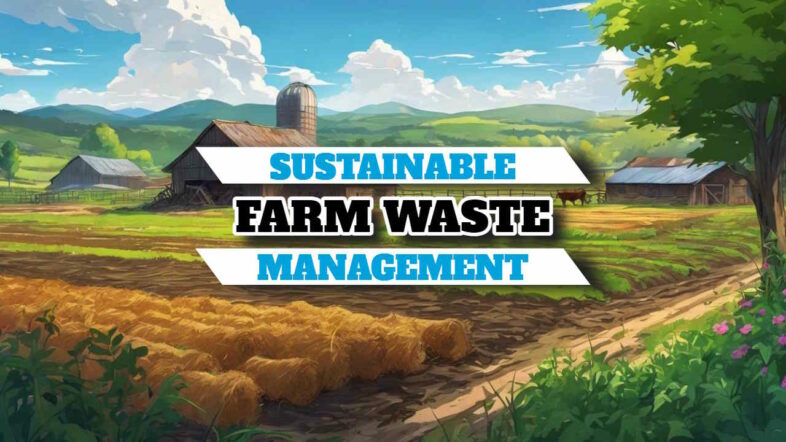

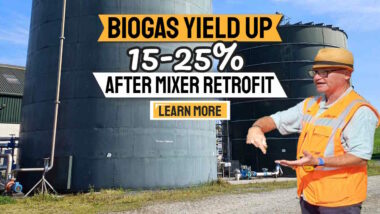

What to do with the digestate is usually brushed aside but its a real environmental concern.
Any recomendarilns?
Yes. I can help there. Over the years I have written at least 9 articles about digestate and how to use it. Type “digestate” into the search box (top right on each page) and “Enter”. Or here is the link https://blog.anaerobic-digestion.com/?s=digestate
For farmers, digestate is the most valuable product from the anaerobic digestion of organic waste streams and biomass resources. When it is used to meet the needs of growing crops replaces all synthetic forms of nutrients which significantly enhances the sustainability of anaerobic digestion and food/feed production.